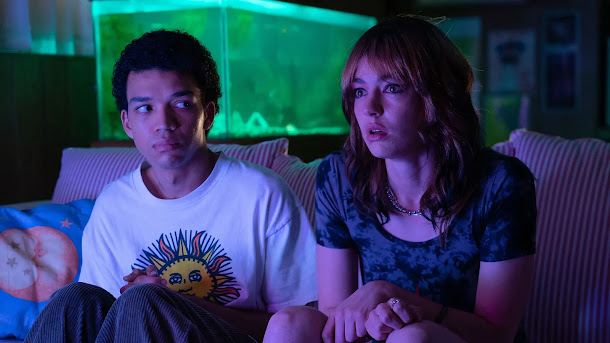"Elvis" review: Baz Luhrmann's glitz and glam only occasionally succeed
"Elvis," 2022, directed by Baz Luhrmann
★★★☆☆
When it came to a crafting a biopic to depict the glitzy, raunchy life of the iconic Elvis Presley, “Moulin Rouge” director Baz Luhrmann was probably the only man for the job. His bedazzled, melodramatic style fits the rocker’s life in a way that few other directors’ do, and such a unique, surreal approach to biographical storytelling feels like a breath of fresh air compared to other recent releases in the genre like “Bohemian Rhapsody” and “Rocketman”. This isn’t to say Luhrmann’s “Elvis” is great or even all that compelling; it has its fair share of missteps and eye-roll-worthy dialogue, but it’s nothing if not visually entrancing and entertaining.
Austin Butler takes on the persona of Presley believably and with incredible grace, but much of the music legend’s story is told through the lens of infamous manager Colonel Tom Parker (Tom Hanks). Hanks puts on a ridiculous Dutch accent, and wears an even less believable fat suit. This works almost as comedic relief throughout the story of Presley’s increasingly tragic life, but it seems unlikely that the humor is intentional.
When the film does succeed, though, it’s unexpectedly grand. The first half of Presley’s story is characterized by Butler in lace shirts, impassioned pelvic thrusting, and, strangely, contemporary soundtracking from Doja Cat, Denzel Curry, and Kacey Musgraves. It wouldn’t seem as though all these elements would fit together, and they don’t always, but on occasion, the titillating mythology of Presley finds its way through Luhrmann’s manic but surprisingly apt choices.
The cracks in “Elvis”, though, while they may have been inevitable, start to show very early on. The film does little to address the long-running accusations that Presley “stole” melodies from historically Black genres; it presents him as a steadfast ally to Black musicians like B.B. King and Little Richard, though the ways in which he paid respect to his influences are up for debate. It would also be remiss to go without mentioning the way the film handles (or rather, doesn’t handle) the colossal gap in ages at the time Presley met his wife, Priscilla (Olivia DeJonge), who was only 14 when he was 24.
Certainly the film’s biggest sin, though, is the lack of commitment to its own aesthetics. The story begins as gaudy, gold-plated fictionalization, but as the overlong film carries on, and as the events of Presley’s life turn more dismal and heartbreaking, the shine wears off. This is clearly an intentional choice, but the over-the-top writing and performances remain, and the resulting conclusion to the film feels forgettable and unaffecting.
Luhrmann misses a number of times, especially thanks to Hanks’ haphazard performance, but the swings he takes are big and bold. Butler not only nails the physicality and verbal affectations of the real Presley, but also brings a personal flair of emotional depth to the role. The daring moments in “Elvis”, the ones that employ Luhrmann’s strangest, most eye-popping aesthetics, are sometimes incredibly entertaining and sometimes fall laughably flat, but these combined with Butler’s revelatory performance need to be seen to be believed. “Elvis” is now streaming on HBO Max.




Comments
Post a Comment